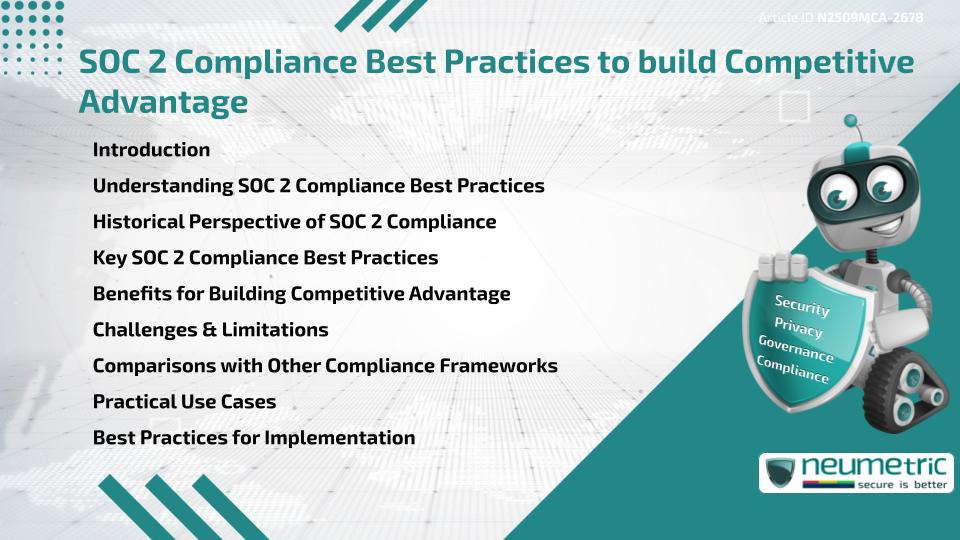Table of Contents
ToggleIntroduction
SOC 2 Compliance Best Practices enable Organisations to protect Sensitive Data, meet Regulatory expectations & gain Customer Trust. By applying these practices, enterprises not only safeguard systems but also use Compliance as a tool for differentiation in competitive markets. This article covers the history, key practices, benefits, challenges, comparisons & Best Practices for implementing SOC 2 Compliance Best Practices to achieve business advantage.
Understanding SOC 2 Compliance Best Practices
SOC 2 Compliance Best Practices revolve around the Trust Services Criteria defined by the American Institute of Certified Public Accountants [AICPA]. These criteria cover Security, Availability, Processing Integrity, Confidentiality & Privacy. Best Practices involve aligning internal Processes, Policies & Controls with these principles to ensure consistent Compliance & Transparency.
Historical Perspective of SOC 2 Compliance
SOC frameworks were developed to standardise reporting on controls at service Organisations. Over time, SOC 2 became essential for technology-driven businesses handling Sensitive Client data. Initially viewed as a Regulatory requirement, SOC 2 Compliance evolved into a benchmark for demonstrating Reliability & Governance to Clients, Investors & Regulators.
Key SOC 2 Compliance Best Practices
Important SOC 2 Compliance Best Practices include:
- Establishing clear Security & Privacy Policies
- Conducting regular Risk Assessments
- Automating Monitoring & Reporting
- Training staff on Security Awareness
- Documenting processes & Evidence for Audits
- Engaging external Auditors for independent validation
These practices ensure Organisations remain prepared for Audits while maintaining operational resilience.
Benefits for Building Competitive Advantage
Adopting SOC 2 Compliance Best Practices delivers multiple business benefits:
- Strengthens brand reputation & Customer Trust
- Enhances resilience against Security Breaches
- Differentiates Organisations in crowded markets
- Improves Audit readiness & reduces Compliance costs
- Supports faster deal cycles with Enterprise Clients requiring SOC 2 reports
Challenges & Limitations
Despite its advantages, SOC 2 Compliance presents challenges. The process can be time-consuming & resource-intensive. Smaller enterprises may struggle with costs & complexity. Additionally, maintaining Compliance requires ongoing monitoring & continuous adaptation to evolving Risks.
Comparisons with Other Compliance Frameworks
Compared to frameworks like ISO 27001 or HIPAA, SOC 2 Compliance focuses specifically on service providers & their handling of Customer Data. ISO 27001 emphasises a broader Information Security Management System, while HIPAA is Healthcare-specific. SOC 2 Compliance Best Practices provide a flexible, industry-agnostic Framework that can apply to any service Organisation.
Practical Use Cases
SOC 2 Compliance Best Practices are valuable across industries, especially in SaaS, Finance & Healthcare. Service providers often adopt SOC 2 to meet Client demands & accelerate contract negotiations. Organisations also leverage SOC 2 reports to demonstrate trustworthiness during Vendor selection processes.
Best Practices for Implementation
To adopt SOC 2 Compliance Best Practices effectively, Organisations should:
- Conduct Gap Assessments to identify control weaknesses
- Prioritise remediation aligned with the Trust Services Criteria
- Engage Stakeholders across IT, Compliance & Leadership
- Automate Evidence collection where possible
- Foster a culture of continuous Security & Compliance awareness
These practices ensure a smoother Compliance journey & position enterprises for long-term advantage.
Conclusion
SOC 2 Compliance Best Practices extend beyond Regulatory obligations. They provide a foundation for building Trust, strengthening Governance & achieving competitive differentiation in demanding markets.
Takeaways
- SOC 2 Compliance Best Practices center on the Trust Services Criteria.
- They strengthen Customer Trust & reduce Audit costs.
- Implementation requires planning, automation & staff training.
- SOC 2 reports can become a key driver of competitive advantage.
FAQ
What are SOC 2 Compliance Best Practices?
They are strategies & processes aligned with SOC 2 criteria to ensure Data Security, Availability, Integrity, Confidentiality & Privacy.
Why are they important for businesses?
They build Customer Trust, strengthen Governance & create differentiation in competitive markets.
How do SOC 2 Compliance Best Practices differ from other frameworks?
They specifically apply to service providers handling Client data, unlike ISO 27001 or HIPAA, which have broader or sector-specific scopes.
What industries benefit most from adopting these practices?
SaaS, Finance & Healthcare Organisations benefit most due to Client demands & Regulatory pressures.
What challenges are involved in adoption?
Challenges include high costs, complexity & the need for Continuous Monitoring.
How can enterprises prepare for SOC 2 Audits?
By conducting Gap Assessments, documenting Evidence & engaging independent Auditors.
Can Small Businesses implement SOC 2 Compliance Best Practices?
Yes, but they may need to prioritise automation & phased adoption to manage costs effectively.
Do these practices improve business growth?
Yes, they accelerate contract approvals, build Client confidence & differentiate Organisations in competitive markets.
Need help for Security, Privacy, Governance & VAPT?
Neumetric provides organisations the necessary help to achieve their Cybersecurity, Compliance, Governance, Privacy, Certifications & Pentesting needs.
Organisations & Businesses, specifically those which provide SaaS & AI Solutions in the Fintech, BFSI & other regulated sectors, usually need a Cybersecurity Partner for meeting & maintaining the ongoing Security & Privacy needs & requirements of their Enterprise Clients & Privacy conscious Customers.
SOC 2, ISO 27001, ISO 42001, NIST, HIPAA, HECVAT, EU GDPR are some of the Frameworks that are served by Fusion – a SaaS, multimodular, multitenant, centralised, automated, Cybersecurity & Compliance Management system.
Neumetric also provides Expert Services for technical security which covers VAPT for Web Applications, APIs, iOS & Android Mobile Apps, Security Testing for AWS & other Cloud Environments & Cloud Infrastructure & other similar scopes.
Reach out to us by Email or filling out the Contact Form…


